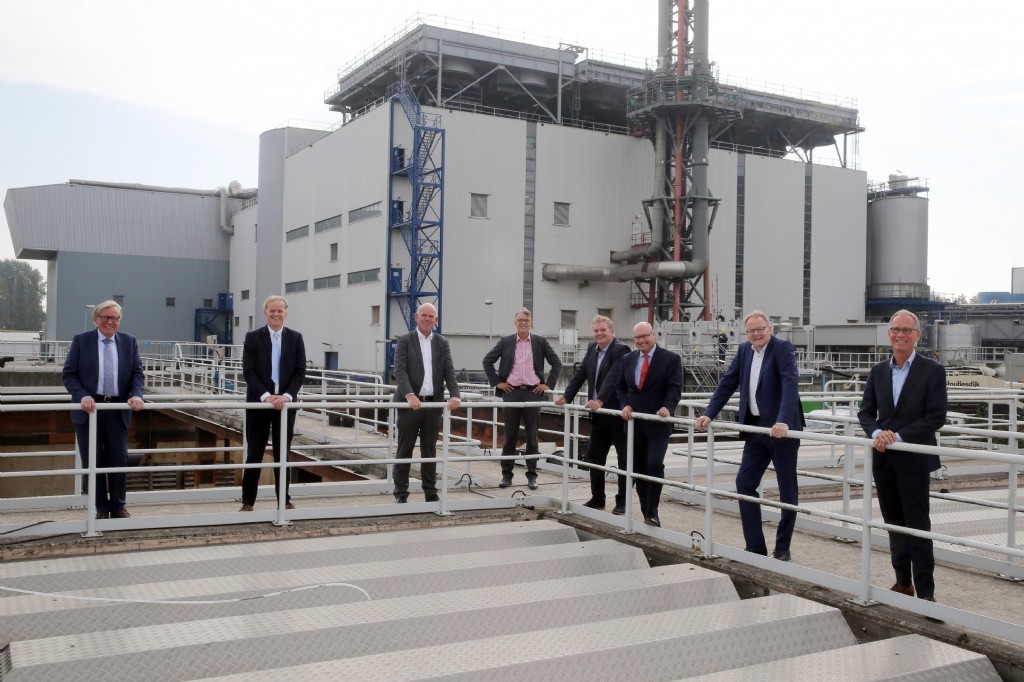Five water boards, STOWA knowledge center, technology company Paques and sustainable waste and energy company HVC have signed an agreement to build a larger scale production unit in Dordrecht for the production of PHBV, a fully biodegradable and sustainable bioplastic. PHBV is made from organic waste streams such as sewage sludge, industrial wastewater and food waste. With this larger scale production unit, the cooperation partners want to build a bridge to the commercial production of PHBV.

In 2016, the five water boards – Brabantse Delta, De Dommel, Hollandse Delta, Scheldestromen and Wetterskip Fryslân – made the bioplastic PHBV in the pilot project “PHARIO” (PHA from RIOolwater) with the help of bacteria that purify wastewater. PHBV is a high quality natural polyester. It is completely biodegradable under natural conditions in soil and composting plants as well as in fresh and salt water.
The operation is as follows. Wastewater contains a lot of volatile fatty acids and the sludge contains bacteria. Those bacteria “feast on” the volatile fatty acids. Like humans store fat in their bodies, these bacteria store PHBV. This PHBV is extracted, after which a powder remains. That powder can be used in various applications.
Applications
PHBV can be used in agriculture and horticulture, amongst other things. For instance, it can be used in biodegradable plant pots for the agricultural sector. As a result, it is no longer necessary to repot young plants during cultivation as the pot is naturally broken down. Another example is the application of PHBV in self-healing concrete for structures such a as basements and tunnels. By adding it, cracks in the concrete are automatically closed again. An additional advantage is that in self-healing concrete often less steel reinforcement can be used, which in its turn contributes to cost reduction and lower environmental impact.
Market development
After the PHARIO pilot project, it was investigated whether the product could be further developed by the market, but this turned out to be too early. Despite the fact that the market for this type of plastic is currently developing and is very promising, the plastics industry, which now often works with fossil plastics from petroleum, first wants to have sufficient material to test the processing and use. The larger scale production unit in Dordrecht will supply the material for this. Various partners are now going to test the material.
Operational at the end of 2021
In the larger scale production unit the experience from the PHARIO project will be combined with the knowledge of partner company Paques. Together with Delft University of Technology, Paques has been developing a technology to also produce PHBV from industrial wastewater. The larger scale production unit will be located at HVC‘s sludge processing plant in Dordrecht. It is expected to open at the end of 2021. In the meantime, a further inventory is being made of potential suppliers of fatty acids (the raw material for making PHBV) and organizations are being sought for other applications of PHBV.
Partners
Wastewater is an important source of energy and raw materials for water boards. Since 2007, the water boards have been working more intensively with each other and other partners to recover valuable substances such as biogas, cellulose, phosphate, alginate, biomass and thus also this sustainable bioplastic.
The project is being developed and realized by a partnership of the Energie- en Grondstoffenfabriek (consisting of the water boards Brabantse Delta, De Dommel, Hollandse Delta, Scheldestromen and Wetterskip Fryslân), knowledge center STOWA, technology company Paques and sustainable waste and energy company HVC. Sludge Processing Noord-Brabant (SNB), AquaMinerals, TU Delft and Wetsus (knowledge center for sustainable water technology) support the initiative with further knowledge development.
Source
Pasques, press release, 2020-09-30.
Supplier
Brabantse Delta
De Dommel
Delft University of Technology
N.V. Slibverwerking Noord-Brabant (SNB)
Paques Biomaterials BV
Stowa
Waterschap Hollandse Delta
Waterschap Scheldestromen
Share
Renewable Carbon News – Daily Newsletter
Subscribe to our daily email newsletter – the world's leading newsletter on renewable materials and chemicals










